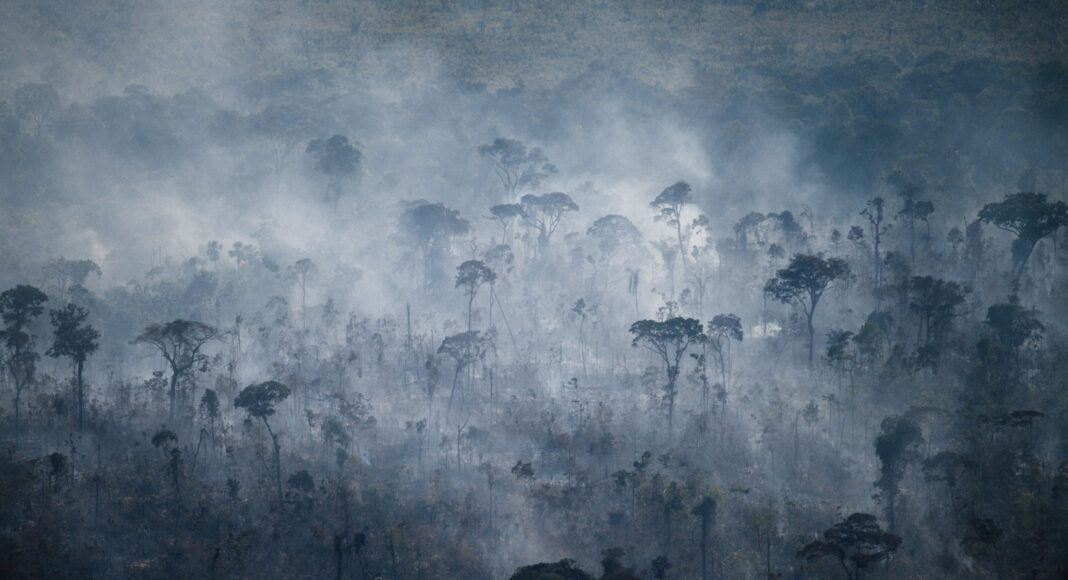10 August 2023. After years of aggressive deforestation, burning and degradation, the mighty and apparently eternal Amazon rainforest is losing its resilience and could reach tipping point in 2029, a mere six years away. That was the terrifying prediction of scientists and Indigenous leaders as the presidents of Amazon nations met this week to decide how they can save it.
The meeting in Belém, at the mouth of the Amazon, was attended by representatives of eight of the nine countries which share the rainforest. They were the presidents of Bolivia, Brazil, Colombia, and Peru, the vice president of Venezuela, the foreign ministers of Ecuador and Surinam, and the prime minister of Guyana. President Macron of France, of which French Guiana is an overseas department, was invited but did not show up.
President Lula personally hosted the meeting, which is an important plank in his plan to reinsert Brazil on the world scene as a mover and shaker. The UN COP 30 climate conference will also be held in Belém in 2025.
Before the official meeting, thousands of Indigenous and NGO leaders held their own three-day summit and produced a document called Amazônia Free of Oil and Gas calling for the immediate elimination of fossil fuels in the region, with the setting of a definite target date. They said the Amazon summit would be an ideal opportunity to do this.
Lula still backing off-shore oil
But rather than eliminate fossil fuels, President Lula is actively supporting the plans of state oil company Petrobras to drill for oil off the coast of Amapá, one of Brazil’s Amazon states which borders the Atlantic Ocean. IBAMA, the state environmental agency, has refused authorization because of the risk of negative environmental impacts, but Petrobras has presented a new request, and Lula supports it, saying the role of the forest is to generate wealth for the population, not be a sanctuary – ignoring the negative experiences of almost every oil producing country in the developing world.
Other members of the Brazilian government justify continued investment in oil exploration, saying it is still needed while the transition to clean energy is made. This has left Environment Minister Marina Silva in an awkward position, not wanting to openly contradict Lula, but questioning, ‘We know how to produce clean energy, why insist on fossil fuel?’ In the last few years solar energy farms have mushroomed, and solar has moved into second place in the Brazilian energy matrix, behind only hydroelectric power, and continues to expand.
More criticism came from environmental and social groups. ‘Drilling for oil in the Amazon cannot be reconciled with sustainable development, the defence of Indigenous lands and combatting climate change’, said activist João Pedro Galvão Ramalho, of the Pan-American Social Forum (FOSPA).
Lula’s pro-oil position was also challenged by Colombian president Gustavo Petro at the summit itself.
What was left out
The summit’s final declaration omitted any reference to fossil fuel exploration in the region. More surprisingly it also omitted any commitment to zero deforestation, mentioning it only as an ideal to be aimed at, without targets or deadlines.
The eight Amazon countries did commit to more cross-border police cooperation to fight illegal mining, environmental and other criminal activities in the region, with the establishment of a headquarters in Manaus. They also suggested creating an Amazon technical panel on the lines of the IPCC, the intergovernmental panel on climate control, and an Amazon Parliament.
The summit ended with a call to rich countries to step up to the plate and provide the funding promised at previous summits, but not delivered. Lula said, ‘We are going to COP28 (the 2023 UN climate conference in Dubai in November) to tell the rich world that if they want to preserve the forests they must pay, not only to look after the trees but to look after the people who live underneath them.’
The Belem declaration paid lip service to the principle that the rights of indigenous and quilombola communities should be recognized and that they should be consulted about all projects that affect their territories. But the summit itself signally failed to put this into practice – ignoring the proposals drawn up in the preceding meeting of indigenous and environmental leaders.
The final document did emphasize the urgency of acting to save the rainforest, the world’s largest carbon sink. It declared that if the 74 per cent of the rainforest which is said to be still intact could be saved, and 6 per cent of degraded areas could be restored, this would add up to the 80 per cent needed to prevent the forest from reaching the point of no return. It recognized that this is only achievable with the help of indigenous and traditional communities.
Since Lula took office, the accelerated deforestation which was encouraged during Jair Bolsonaro’s government, has given way to a fall of 42 per cent in the first seven months of his administration. IBAMA’s manpower and enforcement operations have been beefed up. Hundreds of illegal goldminers have been removed from the Yanomami territory, although some still remain in more inaccessible areas. A few days ago, the cattle farmer responsible for the largest amount of illegal land grabbing inside Amazon conservation areas, was arrested and his herds and ranches confiscated.
As the country which contains 60 per cent of the rainforest, what Brazil does matters more than the actions of any of the other Amazon countries. ‘The Amazon will be what we want it to be’, says Lula. But the failure of the Summit’s final declaration to include targets for zero deforestation, or to ban oil exploration in the region, highlight the domestic pressures and difficulties that he and the other presidents face in taking the bold steps that many were hoping for.
Even so Carlos Nobre, the well-known climate scientist, considers the Summit a positive achievement, coming as it did after four years of a disastrous, climate denying, anti-indigenous government in Brasilia.
Main Image: Greenpeace

